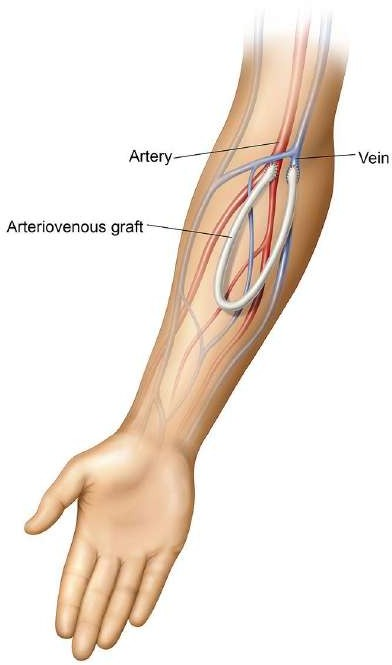A client who has polycystic kidney disease (PKD) presents to the emergency department with reports of a severe headache. Which of the following complications should the nurse expect?
Pancreatic cyst
Cerebral aneurysm
Renal calculus
Diverticulitis
The Correct Answer is B
Choice A reason: Pancreatic cysts can be associated with PKD but are not typically linked with severe headaches.
Choice B reason: Cerebral aneurysms are a known complication of PKD and can present with severe headaches if they leak or rupture.
Choice C reason: Renal calculi, or kidney stones, can cause pain but are not typically associated with headaches.
Choice D reason: Diverticulitis is a condition of the colon and would not be expected to cause headaches.
Nursing Test Bank
Naxlex Comprehensive Predictor Exams
Related Questions
Correct Answer is D
Explanation
Choice A reason: Measuring blood pressure di?erences is not a method to assess the patency of an AV graft.
Choice B reason: Checking pulses is important but does not confirm the patency of the AV graft.
Choice C reason: Using a Doppler stethoscope at the antecubital fossa is not the standard method for assessing AV graft patency.
Choice D reason: Auscultating for a bruit at the site of the AV graft is a common and non-invasive way to assess for patency.

Correct Answer is C
Explanation
Choice A reason: pH 7.30 with elevated HCO3- and PaCO2 suggests compensated respiratory acidosis, not typical for chronic kidney disease.
Choice B reason: pH 7.55 with elevated HCO3- and low PaCO2 suggests metabolic alkalosis, which is not typical for chronic kidney disease.
Choice C reason: pH 7.25 with decreased HCO3- and PaCO2 suggests metabolic acidosis, which is expected in chronic kidney disease due to the accumulation of acids.
Choice D reason: pH 7.50 with low HCO3- and PaCO2 suggests compensated metabolic alkalosis, which is not typical for chronic kidney disease.
Whether you are a student looking to ace your exams or a practicing nurse seeking to enhance your expertise , our nursing education contents will empower you with the confidence and competence to make a difference in the lives of patients and become a respected leader in the healthcare field.
Visit Naxlex, invest in your future and unlock endless possibilities with our unparalleled nursing education contents today
Report Wrong Answer on the Current Question
Do you disagree with the answer? If yes, what is your expected answer? Explain.
Kindly be descriptive with the issue you are facing.
